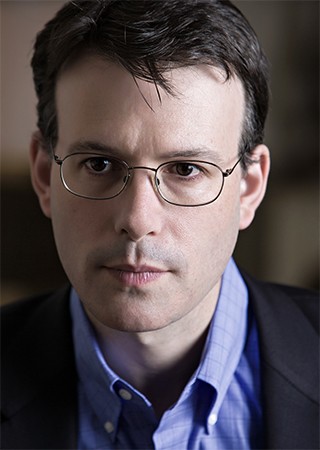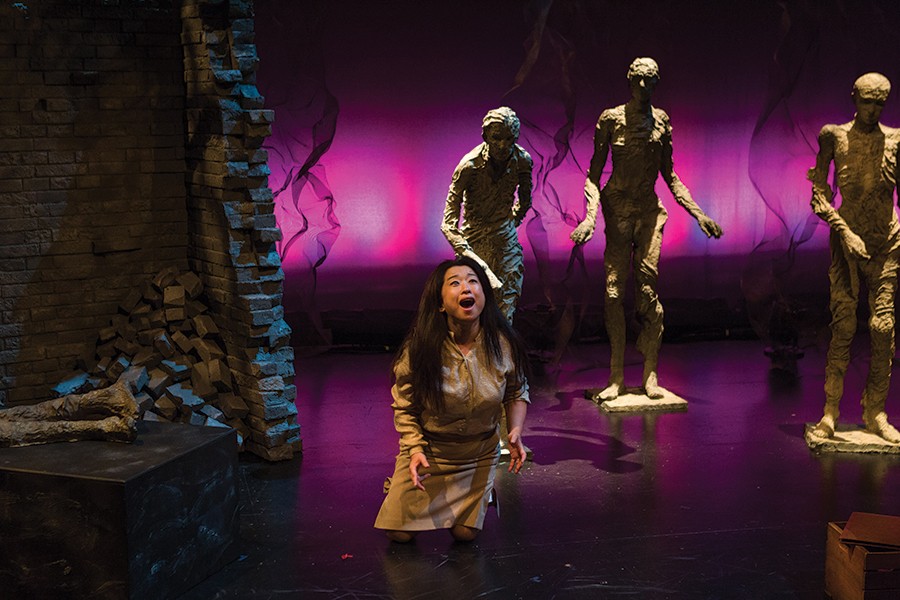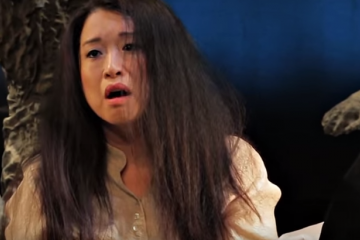Last summer, Michael Hersch, one of the Peabody Institute's more adventurous and challenging faculty composers, debuted the first opera of his two-decade career.

Image caption: Michael Hersch
On the Threshold of Winter, a two-act monodrama, sets the text from Romanian poet Marin Sorescu's book-long poem The Bridge—penned during the author's final two months of living with cancer—to a small, eight-piece ensemble and soprano. It had its world debut last year at the Brooklyn Academy of Music, at which time Hersch told The New York Times that writing this work about love and loss was, in a way, cathartic.
On the Threshold of Winter debuts at the Peabody Institute's Friedberg Hall on Saturday.
The Hub spoke with Hersch last summer about the opera's origins in the composer's own cancer experiences, the loss of a friend, and his reading of The Bridge, wherein he talked about being struck by Sorescu's sobering honesty:
In our society there are many things glossed over when we speak of illness, especially terminal illness. What Sorescu embraces, what I think is rare to find in modern discourse about terminal illness, is that element of raw fear, the uncertainty, the abject terror of the unknown that is so much a part of the experience.
The irony is that most everyone has had somebody close to them suffer from this disease and have been privy to what the illness does to people.
If that sounds emotionally heavy, it's intended to—but as with Hersch's music, there's a roiling human sea churning beneath that heaviness. Jay Nordlinger, writing about Winter in the National Review, remarked: "Sometimes the opera is beautiful and haunting; sometimes it is savage and assaultive. ... Nothing is frivolous or trivial. Everything has a purpose.
Peabody alum and current faculty artist Ah Young Hong reprises her role as Winter's only singing character in what The New York Times called a "soul-baring, courageous performance." Also returning from last year's debut: conductor Tito Muñoz and the new music ensemble Nunc.
The Baltimore debut is the latest local event in a particularly prolific 2015 for Hersch. His song cycle "a breath upwards" had its local debut in April. That same month saw the release of his Last Autumn CD, a recording of Hersch's response to W.G. Sebald's poem "After Nature" written for horn and cello that is a gorgeously arresting, two-hour immersion in complex ideas and overpowering emotions.
On Oct. 16, members of the Atos Trio perform the world premiere of Hersch's Carrion-Miles to Purgatory: thirteen pieces after texts of Robert Lowell at the Library of Congress as part of the 90th anniversary season of the library's concert series. On Nov. 14, conductor Douglas Buchanan leads the Canticum Novum singers through a program that includes Hersch's vocal piece From Ecclesiastes at the Emmanuel Episcopal Church in Baltimore. And on Dec. 2, the Lunar Ensemble, a contemporary music group co-founded/run by Peabody alumni, features Hersch as part of its Pitcher-Perfect Happy Hours at the War Memorial in downtown Baltimore, including the composer's Tenebrae for piano, Two Pieces for Cello and Piano, and the wide-wandered hour for soprano and piano.
Posted in Arts+Culture
Tagged opera, michael hersch










